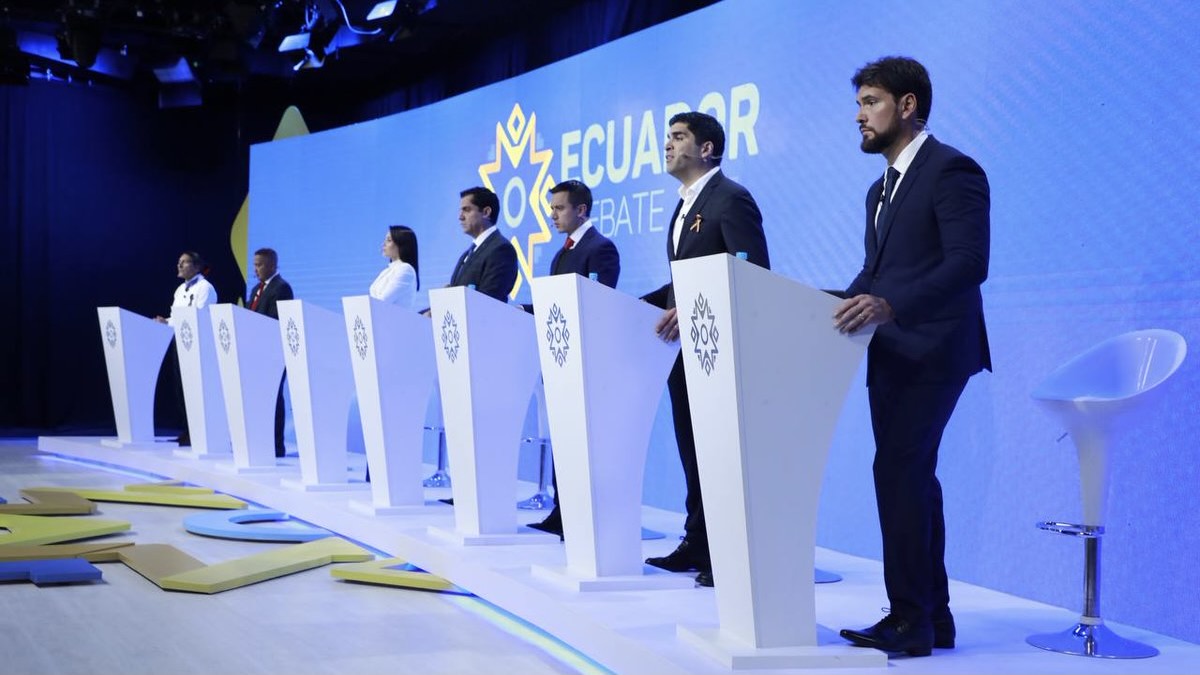On August 20, over 13.5 million Ecuadorians will head to the polls to elect the country’s next president, vice-president and 137 members of the National Assembly, who will complete the current presidential and legislative term that ends in May 2025.
The general elections were originally scheduled to take place in early 2025, but were brought forward after incumbent conservative president Guillermo Lasso dissolved the opposition-dominated unicameral parliament, citing “political crisis and internal commotion” on May 17.
There are now seven candidates contesting for the presidency of Ecuador. Last week, on August 9, Fernando Villavicencio, a former legislator and presidential candidate from the right-wing Build Ecuador Movement, was assassinated leaving a campaign event in the capital Quito.
On August 13, the seven presidential candidates took part in a mandatory debate organized by the National Electoral Council (CNE), which was broadcast on national radio and television. The candidates presented their government proposals during the debate and tried to persuade the electorate to vote for them.
The hopefuls were asked questions on the topics of security and organized crime; the economy, job creation and productive development; social policy; democracy, institutionality and citizen participation; and sustainability, risk management and environmental conservation.
All candidates advocated strengthening security in the country and promised improvements as they stood next to Villavicencio’s empty podium.
Progressive presidential candidate Luisa González from the Citizen Revolution Movement party, who is leading the voting intention in all opinion polls with about 30% of the votes, announced that she would create intelligence systems and coordinate with neighboring countries and international organizations to guarantee national security. “We’ll return security to the streets, so they don’t kill us, with a firm hand against crime,” promised González.
For his part, businessman Jan Topic from the right-wing Country Without Fear alliance, whose campaign focus is to fight the war against drug trafficking in the country, said that he would retake control of the country’s 36 prisons and would integrate all intelligence forces to combat corruption and crime.
All candidates also vowed to boost the economy, each with their vision.
González stressed on the need to reduce fuel prices. For this purpose, she stated that she would resume the Pacific Refinery project, which in turn would generate around 25,000 direct and indirect jobs as well as provide low-cost fuel. She also said that with the money that comes in, her government would invest it to support other public services such as healthcare and education.
For their part, lawyer Bolívar Armijos from the center-right AMIGO movement party and Xavier Hervas from the center-right RETO movement party proposed strengthening the agriculture industry and boosting tourism.
Armijos also said that he would promote the work of mining companies, while Hervas maintained that it is necessary to overcome the extractivist model for an inclusive and sustainable one.
With respect to social policies, all candidates agreed to fight gender violence and child malnutrition.
Former vice president Otto Sonnenholzner from the center-right Actuemos alliance said that his administration would eradicate gender violence, without impunity, with public prevention policies.
For his part, former mayor of Azuay Yaku Pérez from the center-right Claro Que Se Puede alliance announced a special budget to eradicate violence against women, and bonuses for children to fight child malnutrition.
The presidential candidates also presented their proposals to confront corruption with personal attacks against each other.
Former legislator Daniel Noboa from the right-wing National Democratic Action Alliance (ADN) advocated for decentralization and autonomy of provincial and municipal governments.
For her part, González recalled that during the Rafael Correa government (2007-2017) corruption was reduced by 49 points and stressed that “we will do it again” and “return to the transparency of those years.”
Regarding the conservation of the environment, the candidates acknowledged that urgent measures need to be taken.
Environmentalist Yaku Pérez referred to the referendum seeking permission for oil exploitation in Yasuni rainforest and mining in Choco Andino, which will take place alongside early elections. Pérez suggested leaving the resources underground to help mitigate climate change.
Meanwhile, Sonnenholzner spoke of progressively moving towards a model with less environmental impact, and suggested reforestation and electric mobility as solutions.
In Ecuador, in order to win the presidency outright, a candidate needs to obtain more than 40% of the votes and a 10% lead over the second-place runner. In case there’s no clear winner, a run-off will be held on October 15.





